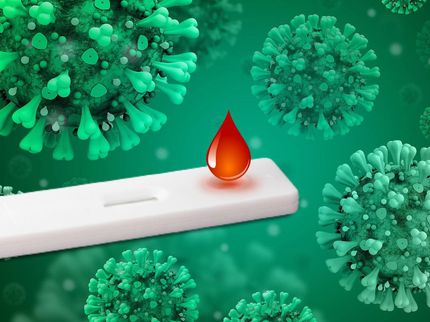ETH Zurich researchers develop antibody test
New test for malaria protection
A person's immune system can form antibodies against sugar molecules on the malaria pathogen, which protect against serious illness. A new blood test developed by a team of ETH Zurich and Swiss Tropical Institute researchers headed by Professor Peter Seeberger enables these antibodies to be detected. The researchers' work was published in "Nature Chemical Biology".
ETH Zurich professor Peter Seeberger has been working on a sugar-based malaria vaccine for years. The new test takes him one important step closer to his goal. The malaria pathogen plasmodium falciparum carries poisonous sugar molecules - called GPIs for short - on its surface that are able to be individually identified. Professor Seeberger's research team is now developing a new method that demonstrates that the malaria pathogen's toxic sugar molecules trigger a specific immune reaction in adults.
Tests show that blood samples taken from adults living in areas of Africa where malaria is endemic contain specific antibodies against particular GPIs. While infection is still possible despite the antibodies, the consequences are less serious. The immune system recognizes the poisonous sugar molecules as foreign bodies and blocks their toxic impact. Not living in high-risk areas, Europeans lack the relevant antibodies. As soon as Europeans are infected with malaria, the number of antibodies increases significantly. Subsequently, there is a direct link between the amount of antibodies and protection against the disease.
This insight is thanks to a novel method for detecting antibodies. Faustin Kamena, a post-doc in Professor Seeberger's lab, has developed a special chip that can, inexpensively and with minute quantities of blood serum and sugar molecules, determine whether or not someone has formed particular antibodies against various GPIs. To this end, the researchers use the purest possible GPIs. These can be produced synthetically and in large amounts in a laboratory, as the Seeberger team has demonstrated in earlier research.
The new method involves affixing over 64 pads comprising pinpoint dots to glass slides. Every little pad consists of several tiny heaps of different GPIs in varying concentrations. When blood serum is then administered to such a pad, possible antibodies specifically bind to certain sugar molecules. Dyes then reveal to which GPIs the antibodies have attached themselves.
Thanks to the information obtained from the chip, scientists can produce the specific sugar molecules that the immune system has to recognize. The findings on natural resistance subsequently acquired are crucial to developing a sugar-based malaria vaccine. This could prove particularly beneficial to children in malaria-infested regions. The millions of malaria sufferers are primarily infants under the age of five as only adults develop antibodies against the malaria pathogen's sugars. An infant's immune system is incapable of recognizing and combating the toxic sugar molecules. Consequently, a new, selective vaccine is now called for. Professor Seeberger states: "This evidence is another important step towards finding a malaria vaccine because we now know which antibodies protect adults."
See the theme worlds for related content
Topic world Antibodies
Antibodies are specialized molecules of our immune system that can specifically recognize and neutralize pathogens or foreign substances. Antibody research in biotech and pharma has recognized this natural defense potential and is working intensively to make it therapeutically useful. From monoclonal antibodies used against cancer or autoimmune diseases to antibody-drug conjugates that specifically transport drugs to disease cells - the possibilities are enormous

Topic world Antibodies
Antibodies are specialized molecules of our immune system that can specifically recognize and neutralize pathogens or foreign substances. Antibody research in biotech and pharma has recognized this natural defense potential and is working intensively to make it therapeutically useful. From monoclonal antibodies used against cancer or autoimmune diseases to antibody-drug conjugates that specifically transport drugs to disease cells - the possibilities are enormous






















































